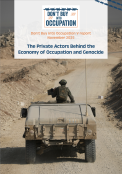Extensive financial ties between European financial institutions and companies linked to occupation, apartheid and genocide in Palestine
Brussels – Updated research from a coalition of European and Palestinian organisations and trade unions reveals that billions of dollars of credit and investment continue to flow in the direction of companies that assist in the maintenance of the illegal situation created by Israel in the occupied Palestinian territory.
-
European financial institutions held over USD 1,503 billion in shares and bonds in companies with activities that help to sustain occupation, apartheid and genocide in Palestine as of August 2025.
-
European financial institutions provided over USD 310 billion in loans and underwriting to these companies from January 2023 to August 2025.
-
1,115 European financial institutions have financial relationships with 104 business enterprises that have activities documented to be assisting in the maintenance of the illegal situation created by Israel in the occupied Palestinian territory and/or the commission of the crime of genocide.
These business activities include the sale, transfer or diversion of weapons to Israel; provision of information and communication technology for surveillance and targeting of Palestinians; and supply of materials, equipment and services that maintain illegal settlements or enable the destruction of Palestinian homes, property and livelihoods.
The scope of this year’s report has been expanded in line with the changed legal reality established by the International Court of Justice (ICJ) and other bodies. In its July 2024 advisory opinion, the ICJ declared Israel’s presence in the occupied Palestinian territory wholly unlawful and in violation of fundamental principles of international law, calling on third party states to take measures to prevent any trade or investment relations that assist in the maintenance of the illegal situation.
The ICJ had previously issued provisional measures in South Africa’s case against Israel in January 2024, warning that Israel’s acts in Gaza could plausibly amount to genocide; later, a UN Commission of Inquiry investigation in September 2025 affirmed that Israel’s acts in Gaza constituted genocide.
In line with the ICJ’s findings, this year’s report no longer limits its scope to companies that assist in maintaining the illegal settlement enterprise in the West Bank, but also examines companies linked to Israel’s broader violations of international law in the OPT, including the commission of acts that amount to genocide, occupation, and apartheid.
The expanded scope of the report means that 104 companies are identified as assisting in the maintenance of the illegal situation, compared to 58 companies in the 2024 report. Companies added to the company list include Amazon (provision of computing power and AI tools used during the genocide in Gaza), Boeing (provision of military equipment, bombs and guidance kits during the genocide) and Cellebrite DI (data harvesting).
These companies join others with a long history of involvement in activities deemed to help sustain the occupation, such as Airbnb (marketing overnight stays in illegal settlements), Bank Hapoalim (financing for settlement construction and expansion) and CAF (operation and maintenance of Jerusalem Light Rail, connecting illegal settlements with Israel).
“Too few financial institutions are doing the heightened human rights due diligence that is expected of them in high-risk and conflict areas. There are notable exceptions, but the overwhelmingly majority either fail to do the due diligence or else turn a blind eye to the fact that they are helping to prolong an illegality that has gone on for almost 60 years. If financial institutions don’t act, they are in effect actively contributing to the problem,” said Eva Gerritse of PAX in the Netherlands.
Despite a ceasefire, Gaza remains a deadly place for Palestinians. Almost 300 Palestinians have been killed by Israel since the ceasefire came into force. In the West Bank, the Israeli army continues to forcibly displace remote Palestinian communities, while illegal settlers attacked Palestinians 260 times in October, according to the UN - more than any other month since 2006.
“Companies should be doing everything they can to avoid sustaining these crimes, and, until they do that, financial institutions should be doing everything within their power to exert influence on companies to address their complicity and, failing that, see to it that they no longer provide them with credit or investment,” said Max Hammer for BankTrack.
Download the full DBIO 2025 report here: https://dontbuyintooccupation.org/
For further comment, please contact:
Max Hammer, Human Rights Campaigner, BankTrack: [email protected], +4917630123032
About the DBIO coalition
Don’t Buy into Occupation (DBIO) is a coalition of 25 Palestinian, regional and European organisations based in Belgium, France, Ireland, the Netherlands, Norway, Spain, the United Kingdom and Palestine. The coalition was formed in January 2021 to document the financial relationships between European financial institutions and business enterprises involved in the illegal Israeli settlement enterprise in the OPT, and now also wider norm violations, including apartheid and genocide. This is the coalition’s fifth annual report, produced with the assistance of the independent research organisation Profundo.



